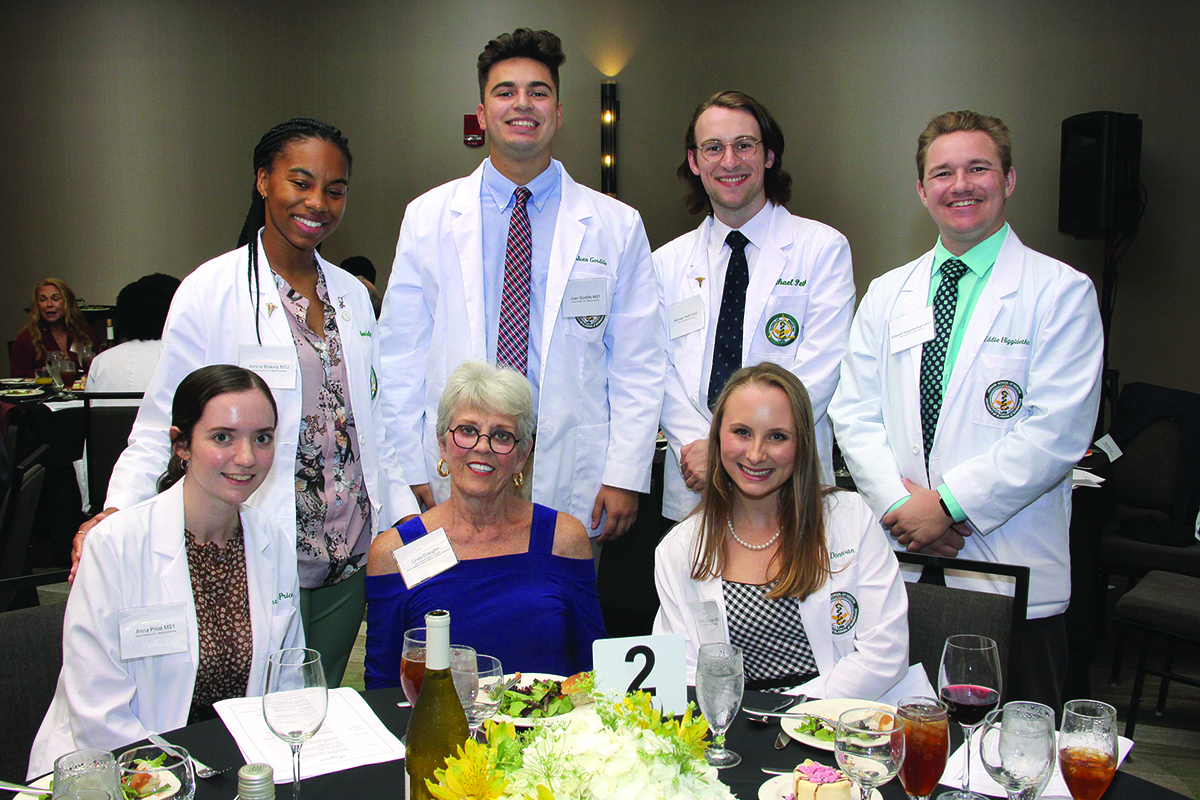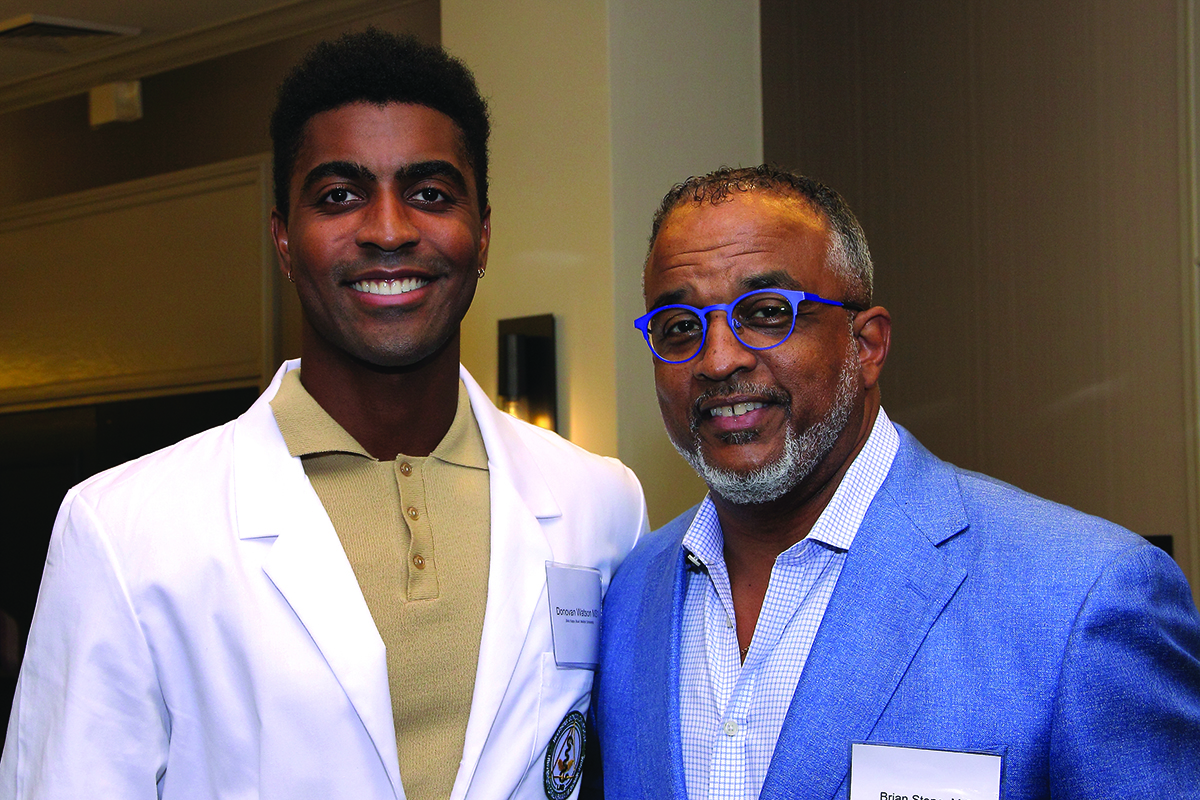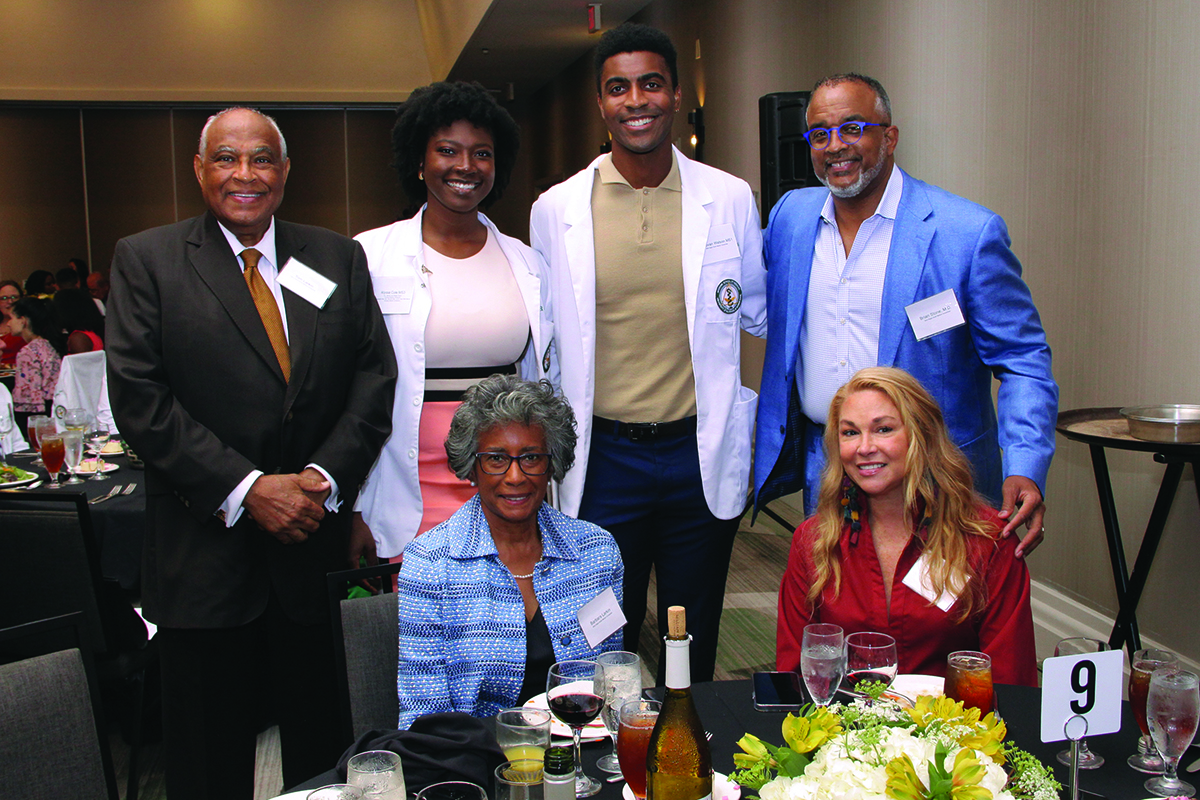On September 20, 2022, 185 scholarship donors and medical student scholarship recipients gathered together at the Hilton Birmingham at UAB for the UAB Heersink School of Medicine Scholarship Dinner. It was the school’s first in-person Scholarship Dinner since the COVID-19 pandemic, and donors and students were excited to be able to meet each other, most for the first time.
The Heersink School of Medicine is fortunate to have an outstanding group of medical scholarship donors. Their generosity encourages young aspiring physicians during a critical moment in their lives and ensures the best and brightest are welcomed into the medical field regardless of their background. For the 2022-2023 academic year, the school distributed more than $4.5 million in scholarship dollars—an almost 8% increase over the previous academic year. Nearly a quarter of the medical student body received a scholarship this academic year.
Read on to learn more about two scholarships—one long-standing and one newly established—that support our students through their medical school journey.
 Linda Draughn with Burleson scholarship recipients at the 2022 Scholarship Dinner.
Linda Draughn with Burleson scholarship recipients at the 2022 Scholarship Dinner.
An Enduring Commitment
It’s no secret that medical school comes with a hefty price tag. Fortunately, recipients of the Paul W. Burleson, M.D. Medical Scholarship—one of the most financially generous scholarships the Heersink School of Medicine offers—are able to focus more on their studies and less on how to afford the experience.
Not surprisingly, having tuition, fees, and other educational expenses paid for positively impacts their medical school experience, and the ripple effect goes far beyond just their four years at the Heersink School of Medicine, recipients say. Because they won’t have to someday face paying off hundreds of thousands of dollars in student loans, the Burleson scholarship gives them freedom to choose the medical specialty they are most passionate about—and not necessarily the one that is the most lucrative. Enthusiasm for primary care takes the driver’s seat, not the worry of having to eradicate exorbitant debt.
Such is the case for scholarship recipient Eddie Higginbotham, a first-year medical student. “There’s the assumption going into medical school that massive debt comes along with it,” he says. “I don’t think anybody plans to come out of medical school without debt. When I got the call back in April that I’d be receiving the scholarship, I was in shock. It was a huge burden and relief lifted off of my shoulders. It definitely freed me up to consider all paths of medicine. For a lot of medical students, income post-medical school is a really big thing. If you come out with $400,000 in loans—even if you come out making $200,000 as a primary care physician—that’s still a huge burden in loans you have to pay off, even though technically you’re making a good income.”
Higginbotham says he wants to become a primary care physician and can do so now without reservation. Had he not received the Burleson scholarship, a higher-paying specialty might have won out. “It freed up that path,” Higginbotham says. “The door is wide open [to become a primary care physician] and not have to go an alternate route.”
The scholarships are awarded to medical students with both high academic standing and financial need, with a preference given to those students who, like Higginbotham, are residents of Alabama and are interested in practicing primary care in the state upon completion of their training. Higginbotham, a native of Corner, Alabama, plans to do just that.
“I hope to be able to give back to the community that gave so much to me—I cannot express enough gratitude,” he says.
 Linda Draughn with Burleson scholarship recipients at the 2022 Scholarship Dinner.
Linda Draughn with Burleson scholarship recipients at the 2022 Scholarship Dinner.
Honoring a Legacy of Care
The Burleson scholarships are named for Paul W. Burleson, M.D., who served the Heersink School of Medicine as an internist for 35 years before retiring in 1986. From his own experience, Burleson was keenly aware of the heavy financial burden medical school debt creates for students. Because of this, he and wife Martha established the Paul W. and Martha R. Burleson Scholarship Endowment and the Paul W. Burleson Foundation, which provides not just medical student scholarships but also internal medicine faculty support. The foundation—established by Burleson’s estate after his death in 2005—is supporting 10 students this academic year alone. Ten students are typically awarded the scholarship annually, and students that qualify may be awarded the scholarship each successive year of medical school.
“Through the Burleson Foundation, we try to honor Dr. Burleson’s wishes to help pay for medical school for deserving students who have both outstanding scholastic achievement and financial need,” says Linda Draughn, Martha Burleson’s daughter and the director and trustee of the Burleson Foundation. “We have been so fortunate to have been able to support so many incredible students over the years.”
One such student is first-year medical student Juan Gordillo, the child of immigrants and both a first-generation college student and first-generation medical student. “Ever since I was a child, medical school was a big dream,” he said. “My parents tried to instill in me that I could achieve anything I want—you know how your parents do. [This scholarship] really helped make that dream a possibility. It allows me to focus on school without thinking about juggling a job on the side. I can’t imagine how difficult that would be, to stay afloat. It guarantees a peace of mind that is invaluable to me.”
Other Burleson scholarship recipients echo that sentiment. Third-year medical student Michael Pettit said he was nervous coming into medical school because his family wasn’t able to help him financially; the Burleson scholarship reassured him that medical school was the right path. Being awarded the Burleson scholarship cemented second-year medical student Amiria Blakely’s desire to become a primary care physician, as well as her desire to stay in Alabama to show others from the state that anything is possible.
“Having this scholarship makes it so much easier for me, and takes away the thought of ‘How am I going to do what I love and also provide for myself?’” Blakely says. “I can focus on how to be a good student and future physician to make a bigger impact in the lives of my future patients. Initially, I thought maybe I’d go somewhere [outside of Alabama] for residency. But knowing that there is such a large community here who wants to see students succeed and make a difference in Alabama’s health care system has changed my perspective to stay here and be a part of this environment. Having the direct support from the Burleson scholarship and knowing that they want to see me succeed has made a huge difference in my mindset and what I want to do moving forward.”
 Donovan Watson and Brian Stone
Donovan Watson and Brian Stone
“We’ve Got to Do Something”
Brian Stone, M.D.—a urologist who lives in Birmingham and practices in Jasper—still remembers what his mentors told him.
“As my mentors steered me along the way—some of whom were African-American—they didn’t ask much of me other than, if I had the opportunity, to reach back and help a young Black student,” Stone says. “I do the same with all of my students, but I’m very conscious of underrepresentation in our population. I do everything I can to teach and also tell the people I’m mentoring to do the same—be a mentor to somebody. You never know who you may influence.”
One student Stone mentors is Donovan Watson, a first-year medical student at the Heersink School of Medicine. Watson is the first recipient of the Beta Kappa Boulé Medical Scholarship. The scholarship, which is funded by a $25,000 endowment, was established this year to support a URiM (underrepresented in medicine) student at the Heersink School of Medicine. Beta Kappa Boulé—which is the Birmingham chapter of Sigma Pi Phi Fraternity—is an organization that is committed to mentoring young African-American men to become successful. The national organization was founded in 1904 and is the oldest graduate African-American fraternity in the country.
“[Beta Kappa Boulé] has always represented some of the most successful Black men in the Birmingham community—doctors, lawyers, and businesspeople,” Stone says. “We have always been very socially conscious, particularly now with the precipitous decline of African-Americans in STEM [science, technology, engineering and math] careers. Creating this scholarship was part of this initiative, and we’ve also created a STEM program for the Boys and Girls Club of Birmingham, an after-school program to introduce middle school to 12th grade kids to STEM activities. Our goal is to increase the pool of academically qualified kids with an interest in STEM majors, which will allow UAB to recruit more Alabama natives into the School of Medicine who will more likely stay and practice medicine in Alabama.”
The Beta Kappa Boulé Medical Scholarship—funded by 13 members of the chapter, the majority of them physicians themselves, and a grant from the Beta Kappa Boulé national office—seeks to increase the number of Black students admitted to medical school, which Stone says is at its lowest point since 1978.
“That was kind of a call to action,” he said. “We’ve got to do something.” The chapter’s goal became clear: to address the declining number of Black medical students. This scholarship is one way to help in that effort, Stone says. “Physicians of color tend to take care of the majority of Black patients, and they’re much more likely to work in the communities where those patients are,” he says. “It’s very important to us for that reason. Diversity in the physician workforce is critical in maintaining compassionate care for all.”
The Heersink School of Medicine, which is committed to diversity, provided a one-to-one match for Beta Kappa Boulé’s scholarship effort.
When Watson received his acceptance letter to the Heersink School of Medicine, it was accompanied by an email notifying him he’d received the scholarship, alleviating a significant financial burden for Watson and his family. The scholarship will cover 75 percent of Watson’s medical school tuition for four years.
“I was beyond happy,” Watson says. “It really helps my family out so much. I don’t have to take on student loans, and it helps me tremendously. Also, I don’t have to worry about working as much, which helps take a weight off of my shoulders.”
 Supporters of the Beta Kappa Boulé Medical Scholarship with recipient Donovan Watson (back row, second from white) and scholarship recipient Alyssa Cole (second from left) at the 2022 Scholarship Dinner.
Supporters of the Beta Kappa Boulé Medical Scholarship with recipient Donovan Watson (back row, second from white) and scholarship recipient Alyssa Cole (second from left) at the 2022 Scholarship Dinner.
Amplifying Diverse Voices
Watson—who has known he wanted to be a physician since he was a young child—received his undergraduate degree from UAB, and the Heersink School of Medicine was always his top choice, he says.
“[Medicine] was one of those fascinations I’ve had since I was a little kid,” he says. “I’ve had a couple of procedures myself and watching doctors doing different things from a young age—I thought that was the coolest thing ever. As I got older and was doing different school assignments, science courses related to medicine was what I naturally gravitated towards. I did research on my own and volunteer work, and it really pushed me to this path.”
In addition to the financial support, Watson says he has met many minority physicians through his connection to Beta Kappa Boulé, including Stone, who Watson shadowed in his practice, Jasper Urology Associates.
Watson says he is interested in surgery, but still undecided as to what type of medicine he wants to practice long-term. Meeting the doctors in Birmingham’s Beta Kappa Boulé chapter will allow him to be mentored by doctors who can help him find the right fit for him in medicine.
“It’s opened doors to meet a lot of new people I might not have been able to meet had I not gotten the scholarship,” Watson says. “This has definitely helped and will help me going forward even more. [I want to] see what knowledge about their fields they can share. I’m very interested to hear what advice they have for me going forward in life.”
When underrepresented populations don’t have a seat at the table, it hurts the practice of medicine in the United States, Stone says. The Beta Kappa Boulé Medical Scholarship hopes to do its part to amplify the African-American voice in the profession, specifically in Alabama.
“Having diversity of thought in graduate medical education increases the likelihood of a compassionate physician,” Stone says. “We need diverse representation in all STEM professions.”
To learn more about supporting medical scholarships and the Dean’s Office scholarship match, contact Erica Hollins at (205) 996-6839 or elhollins@uabmc.edu. – Rachel Burchfield